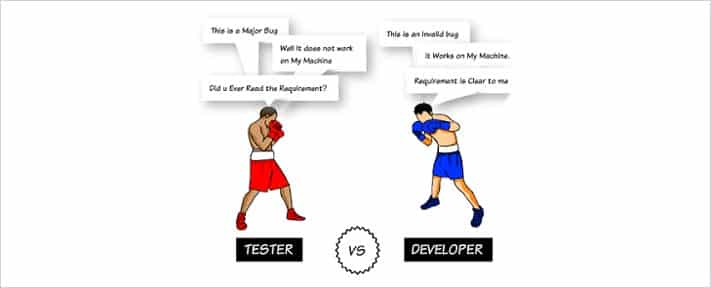An Unending Squabble!

- May 25, 2014
- admin
The process of the software development is a complex and complicated process and involves the interaction and collaboration of number of individuals. The most notable individuals involved in the development process include software test engineers, software developers, business analyst and system analyst. However, due to the pragmatic and high degree of interaction between the developer and tester, there are greater chances of conflict between the two. Let’s look at the very five reasons that can result in a conflict between the organization’s two most valuable resources.An interpersonal conflict between a tester and developer is inevitable and persuasive because of many reasons.
-
Poor Planning and Harsh Deadlines:
The high pressure and stress to deliver the project in a tight deadline in order to thrill and impress the clients is one of the most prominent reason that can lead to a conflict between the two. Poorly planned projects and sending the code at the last moment to the QA team result directly contribute to an interpersonal clash and conflict.
-
Higher Interaction:
Previous studies used to define testing as a post-hoc activity. However, as the modern day studies state testing as a more pragmatic and practical activity that should take place just after initiating the development process, it increases the interaction and poses greater chances of conflict between the developer and the tester.
-
The difference in the Personality Attributes:
The difference in the mental process and personality attributes of the developers and testers is a major reason that possesses chances of conflict. Most of the developers get too protective when testers identified a defect or flaw in an application, coded by them. Moreover, the core responsibility of the developer is to fulfill the technical requirements, while the main focus of the tester is to look at it from the perspective of user requirements. These differences can also result into a clash between the two.
-
Difference in the job functionality:
The differences in the job functionality between the two can also result in an interpersonal conflict. The most desired responsibility of the developer is to maximize efficiency whereas the primary responsibility of the tester is to foster effectiveness, i.e. to ensure quality when delivering the end product. The difference between their distinctive goals and job functionalities can automatically persuade a clash.
-
The difference in the level of experience:
The difference in the level of experience can also result into a clash or conflict. Mostly, highly experienced developers work with the less experienced testers and the difference in the opinion and the different perceptions of the two regarding their relative importance within an organization can lead to a clash.
It is always a good practice for the software testing services providers to plan the project and properly allocate the time to the number of steps that take place in the development process according to their priority and preference. There should also be a backup margin to handle any kind of delays and issues. The management science has also suggested different types of conflict management styles to cope and tackle such kind of conflicts between the employees within an organization. These conflict management styles vary in nature and are used by the team leads and the higher level management to deter the chances of conflict and to gain a positive outcome in case of a conflict.











